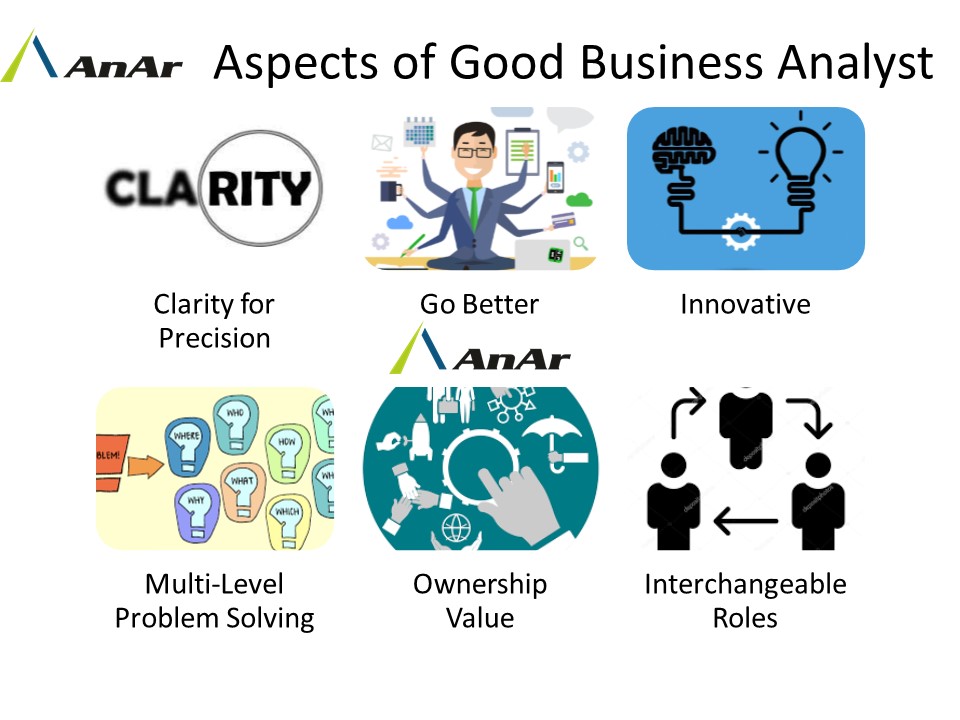Business Analyst plays a role of sustainability expert for an organization. Chief focus is on identifying business needs and opportunities, defining market approach and organization processes. Standardizing workflow and system analysis for interpreting technical requirements is a business analysis.
Business Analyst ensures the strategy, implementation, process design, operational efficiency, timely delivery, quality of the services.
Exposure of a Business Analyst in the market is not restricted to Information Technology, Telecom, Finance, Banking & Insurance, Healthcare, Social Services, Government, and Public Sector. They are accountable for the road map, processes, data models, business cases, and requirement management. Time management and stakeholder management is an implicit priority.
Scope of work for is not fixed, thus the growth in this field is not confined. Aspects of Good Business Analyst includes multi-tasking and mainly bifurcated in the top six skills.

Top 6 Skills needed to be a good Business Analyst:
- Clarity for Precision: Overall sanity in dealing with five W’s (What, When, Why, Where, Whom). How will this W’s be enrolled together to perform extraordinarily. The clarity in BA’s thoughts facilitates the overall communication within the organization. Documentation is central and execution of documented facts and interpretations is the lookout of a Business Analyst. Evaluation of resources and interweaving them to the opportunities requires a skill. Analysis of skill sets, funds, systems, workforce, project needs, and profitability is primary. Domain knowledge if not expertize can assist in presentation and managing the workflows. Accurate presentation is of paramount importance for consistent growth. Knowledge transfer as and when required and the scope statements provide clarity to the path. Defining scope will bind everyone with timelines and commit the deliverables. Single point of contact for each category defined in the project and in non-availability of the same, BA ought to support. Getting oriented resolves ambiguity, introduces a comfort level within the members. Plan the action items to avoid the repetitive work. Business objectives should be on the table. Ensure the requirements match with objectives of your primary business. Plan the review of detailed requirements, if required re-sequence. A business case is a powerful guideline, create, and refer if needed.
- Go Getter: Strive towards the specifications of business betterment. Stipulations vary but determinations do not. Business Analyst is a powerhouse for management and employees. BA’s attitude can influence the work atmosphere, spread positivity, and infuse a new mind-set. Having a go-getter attitude can suffice the need of being energetic but business functions on dynamics. Flexibility in approach and attitude helps to deal with the change producing forces. Performance and the acceptable level of deviation from the requirement requires managerial skills. Distribution of requirement charter has to accompany the continuous interpretation of the client expectations. Affirmativeness lets you seek help for the grabbed specific problem. A go-getter never refrains from seeing the possibilities that others share. Approaching the one who is relevant for the job is in their blood. They do not shy away from the probable methods of getting work done or experimenting with new ones. Negotiating to convert the plans into actions. Desired actions need followups and group formations for collective contributions. Active participation by BA can recoup team members chipping in. If implementation is missing, you are on a wrong path and correct it with reinventing ideas.
- Innovative: Pioneering the ideas with the originality fuels innovation. Form the ideas that offer solutions to the existing issues. Foresee the introductory level, process, and finished product or even market-level challenges. Innovate the function of Business Analyst, not challenging self is introducing under development. Cultivate the platform towards constant invention in the company. Engage people in participation allow them to float questions. Hold discussions to originate the findings for the beneficiaries. Involve people but introduce help groups to lead them. Use networking for innovative solutions and add to the abilities. Unmatched expectations are barriers to overcome in the stipulated time. Innovation in convincing teams, external resources, clients and self for that extra mile. Work pressure and work pleasure are two sides of a coin flip occasionally.
- Multi-level Problem Solving: Techniques, tools, and experience help when problem-solving is an attitude and not the saddle. BA should be able to structure the problem, look into the loopholes, and find better chances for success. Provisions, precautions, and sinking funds are pacifiers. Circumstantial ease to tackle the petty and significant problems is crucial. Communication for enhancement and support is motivating and smooth. Inspire people to try solving the issues at their level and keep the managerial and business analyst’s channels open. Approachable leaders are not just favorites they are adorable. Conflicts do not ruffle them, and this affixes them to the timelines and deliverables. Controlling the uncontrollable is misleading the teams. Business Analysts know of the facts about the things beyond control hence do not tyrannize. They are not alone in finding the answers to tough questions. Verifying the solutions and analysis of gaps as per the scenario helps in problem-solving.
- Create Ownership Values: Organizations are the result of team efforts hence ownership needs to be segregated and dispersed. Concentration of ownership creates a bottleneck in decision-making. Building team structures that support each other can help in maintaining the business values. Make the team members a good decision-makers, Business Analyst unites them in the establishment’s growth. Roles and responsibilities draw the performance of in-house parties. External parties like stakeholders, consultants, and vendors have indirect admittance to organizations. Be open to new approaches and techniques, it helps to incorporate better values into the business.
- Interchangeable Roles: Business Analyst’s role needs to immerse oneself in the possibilities to convert them into realities. Commitment and deadlines are part of every project. The capability to perform in adverse situations, making the team see your vision, interchange the thinking caps when needed is a strength. The requirements designated to departments, set procedures and categorizing efforts may be amended but the transformation should interlock opportunities. Throughout the entire project life cycle till the end the stages that analyst has to cross are identifiable. The solutions from development to deployment stage should offer results as determined. Maintenance of systems, processes, reports, corrections or replacements are the areas where skills need to be interchanged.
Demand for Business Analyst is rising with the digital transformation and the change in strategies of the organizations. Simplification of analytical’ s cannot seize to be in demand. Critical thinking, building relationships, using the latest techniques for analysis and public speaking indicates virtuous competence. The ultimate purpose is to create an asset for the organization.




